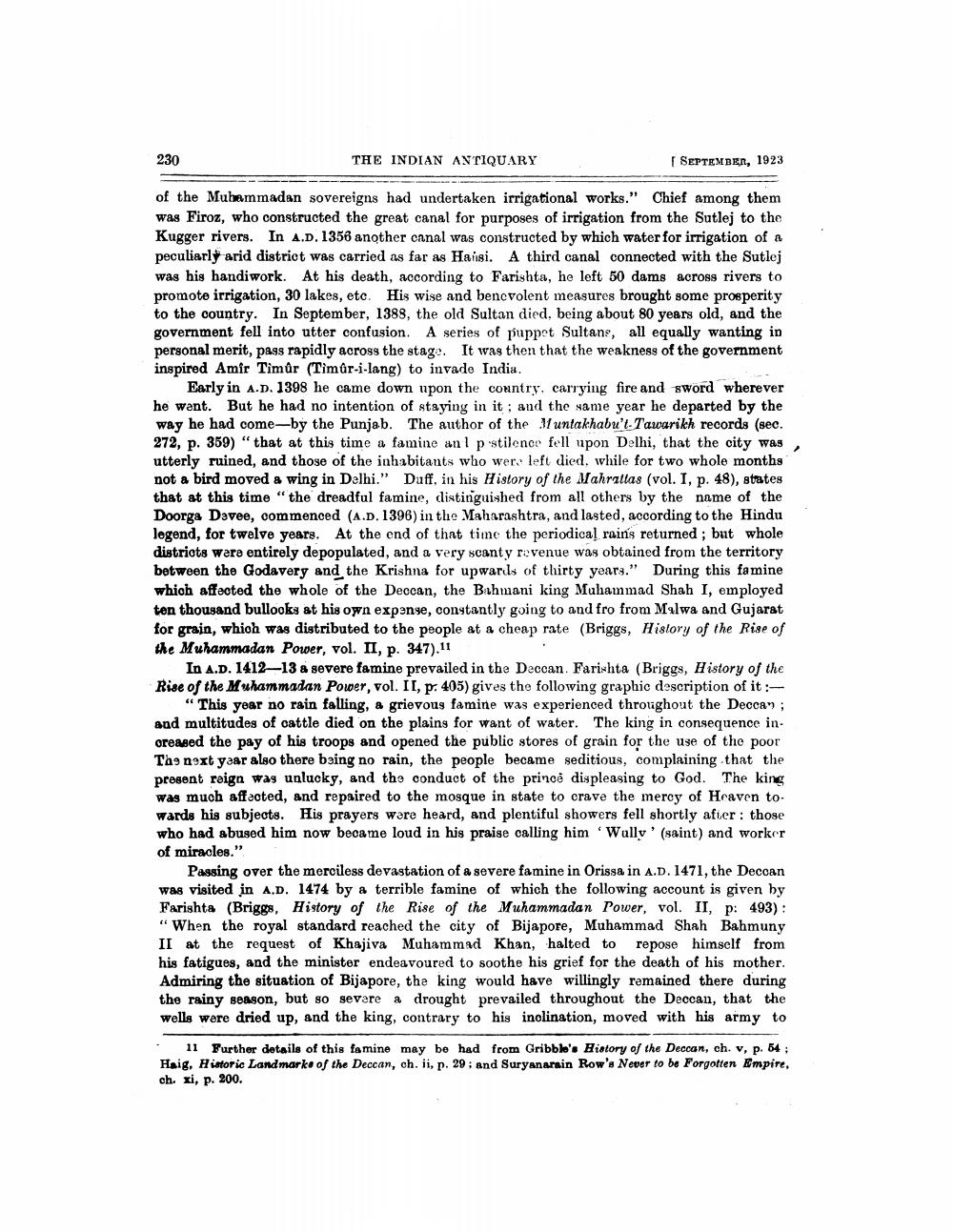________________
230
THE INDIAN ANTIQUARY
SEPTEMBER, 1923
of the Muhammadan sovereigns had undertaken irrigational works." Chief among them was Firoz, who constructed the great canal for purposes of irrigation from the Sutlej to the Kugger rivers. In A.D. 1356 another canal was constructed by which water for irrigation of a peculiarly arid district was carried as far as Halisi. A third canal connected with the Sutlej was his handiwork. At his death, according to Farishta, he left 50 dams across rivers to promote irrigation, 30 lakes, etc. His wise and benevolent measures brought some prosperity to the country. In September, 1388, the old Sultan died, being about 80 years old, and the government fell into utter confusion. A series of puppet Sultans, all equally wanting in personal merit, pags rapidly across the stage. It was then that the weakness of the government inspired Amir Timur (Timur-i-lang) to invade India.
Early in A.D. 1398 he came down upon the country, carrying fire and sword wherever he want. But he had no intention of staying in it, and the same year he departed by the way he had come-by the Punjab. The author of the luntakhabu't.Tawarikh records (sec. 272, p. 359) "that at this time a famine an! p stilence fell upon Delhi, that the city was utterly ruined, and those of the inhabitants who were left died, while for two whole months not a bird moved a wing in Delhi." Duff, in his History of the Mahratlas (vol. I, p. 48), states that at this time "the dreadful famine, distinguished from all others by the name of the Doorga Davee, commenced (A.D. 1396) in the Maharashtra, and lasted, according to the Hindu legend, for twelve years. At the end of that time the periodical rains returned; but whole districts were entirely depopulated, and a very scanty revenue was obtained from the territory between the Godavery and the Krishna for upwards of thirty years." During this famine which affected the whole of the Deccan, the Bahmani king Muhammad Shah I, employed ten thousand bullooks at his own expense, constantly going to and fro from Malwa and Gujarat for grain, which was distributed to the people at a cheap rate (Briggs, History of the Rise of the Muhammadan Power, vol. II, p. 347).11
In A.D. 1412-13 a severe famine prevailed in the Deccan Farishta (Briggs, History of the Rise of the Muhammadan Power, vol. II, p. 405) gives the following graphic description of it :
"This year no rain falling, a grievous famine was experienced throughout the Decca" ; and multitudes of cattle died on the plains for want of water. The king in consequence in. creased the pay of his troops and opened the public stores of grain for the use of the poor Tag next year also there being no rain, the people became seditious, complaining that the present reign was unlucky, and the conduct of the prince displeasing to God. The king was much affected, and repaired to the mosque in state to crave the mercy of Heaven to. wards his subjects. His prayers ware heard, and plentiful showers fell shortly after: those who had abused him now became loud in his praise calling him Wally' (saint) and worker of miracles."
Passing over the merciless devastation of a severe famine in Orissa in A.D. 1471, the Deccan was visited in A.D. 1474 by a terrible famine of which the following account is given by Farishta (Briggs, History of the Rise of the Muhammadan Power, vol. II, p: 493): "When the royal standard reached the city of Bijapore, Muhammad Shah Bahmuny II at the request of Khajiva Muhammad Khan, halted to repose himself from his fatigues, and the minister endeavoured to soothe his grief for the death of his mother. Admiring the situation of Bijapore, the king would have willingly remained there during the rainy season, but so severe a drought prevailed throughout the Deccan, that the wells were dried up, and the king, contrary to his inolination, moved with his army to
11 Further details of this famine may be had from Gribble's History of the Deccan, ch. v, p. 54 ; Haig, Historic Landmarks of the Deccan, ch. ii, p. 29; and Suryanarain Row's Never to be Forgotten Empire, ch. xi, p. 200.




